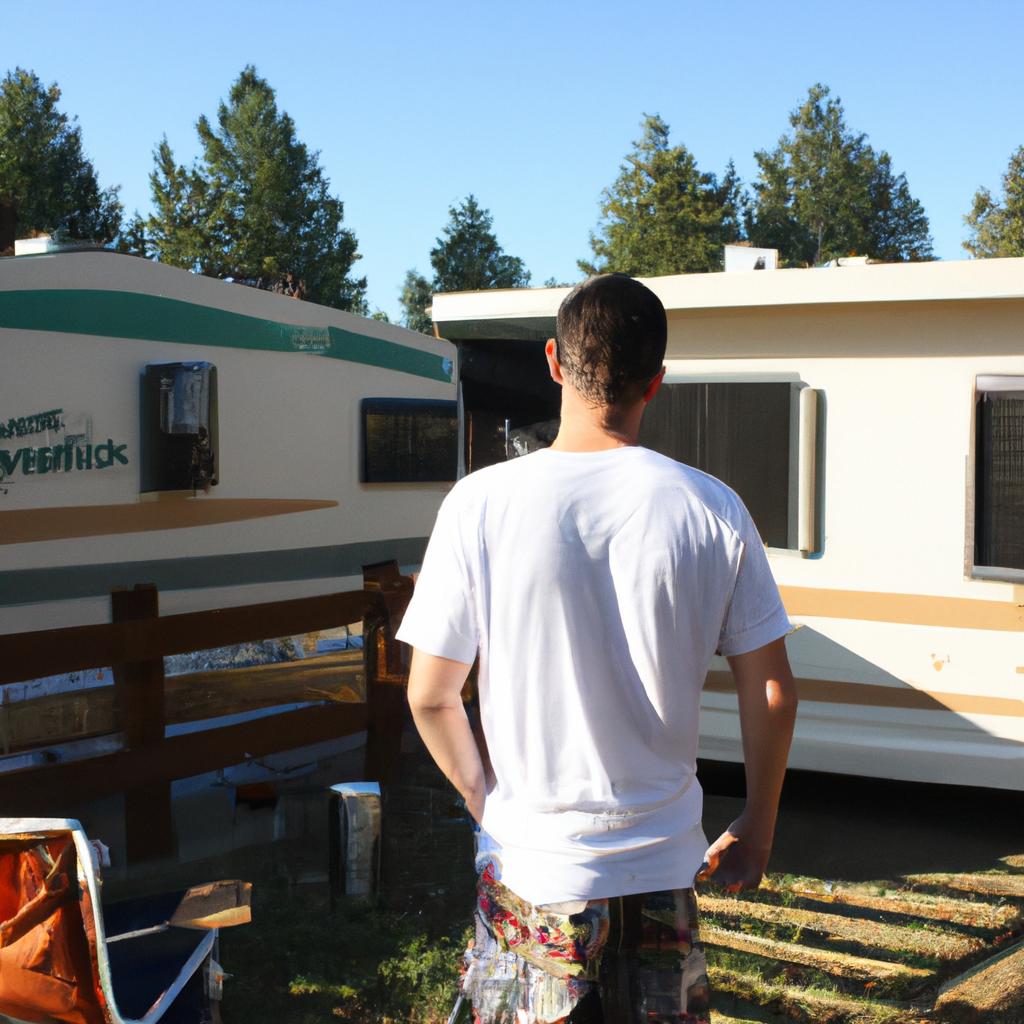The availability of RV park accommodations has become a significant concern for travelers seeking temporary housing options. One example that highlights this issue is the case of Mr. Johnson, an avid traveler who planned to embark on a cross-country road trip with his family in their newly purchased recreational vehicle. Excited about exploring new destinations and experiencing the freedom of life on the open road, they soon discovered that securing a spot at popular RV parks required fulfilling certain deposit requirements.
In recent years, the demand for RV park reservations has surged due to the increasing popularity of mobile lifestyles and travel adventures. This surge in demand has led many RV parks to implement stringent deposit requirements as a means of managing their limited resources effectively. These requirements often involve placing an upfront monetary deposit or adhering to specific reservation policies to secure accommodation within these sought-after locations. Consequently, it has become imperative for travelers like Mr. Johnson to understand and navigate through these deposit requirements in order to ensure a smooth and enjoyable journey without facing unexpected obstacles along the way.
Understanding deposit requirements
When considering a stay at an RV park, it is important to understand the deposit requirements that may be in place. These requirements are put into effect by RV parks as a means of ensuring financial security and minimizing potential losses. By understanding these requirements, individuals can plan their stays accordingly and make informed decisions.
To illustrate the importance of deposit requirements, let us consider the case of Mr. Smith, who planned a week-long vacation at an RV park but failed to read or comprehend the terms and conditions prior to making his reservation. Upon arrival, he was surprised to learn that a substantial deposit was necessary to secure his spot. Unfortunately, Mr. Smith had not budgeted for this expense and was unable to proceed with his stay.
The existence of deposit requirements serves several purposes within the operations of RV parks. Firstly, they help protect against cancellations or no-shows by requiring guests to commit financially upfront. This ensures that spaces are not left vacant unnecessarily, allowing other travelers to enjoy their stay. Secondly, deposits act as insurance against any damages caused during the rental period, providing peace of mind to both park owners and visitors alike.
In order to emphasize the significance of deposit requirements further, we present a bullet point list outlining their benefits:
- Encourages commitment from guests
- Minimizes financial risks for RV park owners
- Guarantees availability for other prospective visitors
- Provides protection against damages
Additionally, we provide a table below summarizing common types of deposits required by RV parks:
| Deposit Type | Purpose |
|---|---|
| Reservation | Secures booking |
| Security | Covers potential damages |
| Pet | Ensures responsible pet ownership |
| Seasonal/Monthly | Long-term stays |
In conclusion, understanding deposit requirements is crucial when planning a stay at an RV park. By doing so, individuals can avoid unexpected financial burdens and ensure a smooth experience.
Factors that influence deposit amounts
Understanding deposit requirements is crucial when planning a stay at an RV park. These requirements can vary depending on various factors, including the length of your intended stay and the amenities provided by the park. To illustrate this, let’s consider a hypothetical scenario where you are looking to book a month-long vacation at an RV park with excellent facilities.
Firstly, it is important to note that many RV parks require a deposit upon making a reservation. This deposit serves as a guarantee for both parties involved – the park management and the guest. By providing a deposit, guests demonstrate their commitment to honoring their reservation while also giving peace of mind to the park management that they will not suffer financial loss due to cancellations or no-shows.
When it comes to determining deposit amounts, several factors come into play. These include:
-
Length of Stay: The longer your planned stay, the higher the deposit may be required. This is because extended stays tie up resources such as specific campsites or facilities for more extended periods.
-
Amenities and Services: Parks with additional amenities like swimming pools, recreational areas, laundry services, and Wi-Fi often have higher deposit requirements than those without these features. The added cost of maintaining and operating these amenities necessitates a larger initial payment from guests.
-
Peak Season vs Off-Peak Season: During peak seasons when demand is high, some RV parks may impose higher deposits compared to off-peak times. This ensures that spots are reserved for guests who intend to utilize them fully during busy periods.
-
Special Events or Holidays: In cases where there are special events or holidays occurring during your intended stay period, parks might increase their deposit requirements due to increased demand and limited availability.
To make this information easier to digest, let’s summarize it in markdown format:
- Longer stays generally require higher deposits
- Parks with more amenities typically have higher deposit amounts
- Peak season bookings often come with increased deposit requirements
- Special events or holidays may result in higher deposits
Now that we have explored the factors influencing deposit amounts, let’s move on to discussing the importance of reservation policies and how they affect your RV park experience. By understanding these policies, you can ensure a smooth and stress-free stay at your chosen destination.
The importance of reservation policies
Factors That Influence Deposit Amounts
Building on our previous discussion of factors that influence deposit amounts, we will now explore how these factors can impact the availability of RV park reservations. To illustrate this concept, let’s consider a hypothetical case study involving an RV park located near a popular tourist destination.
In this scenario, during peak travel season, demand for RV park spaces is high due to the influx of tourists visiting nearby attractions. As a result, the RV park management decides to implement specific deposit requirements to ensure reservation bookings are secured and cancellations are minimized.
One example of such a requirement is setting higher deposit amounts for longer stays or larger groups. By doing so, the management aims to mitigate potential losses caused by last-minute cancellations or no-shows. This approach not only encourages guests to commit fully but also allows the establishment to better plan and allocate resources effectively.
To further understand why deposit requirements play a crucial role in managing reservation availability, let us examine their significance through several key points:
- Financial Security: Deposits provide financial security for both the guest and the establishment. Guests feel confident in their booking while knowing they have invested in securing their desired spot. Simultaneously, establishments can rely on deposits as a means of covering operational costs and safeguarding against unforeseen circumstances.
- Reservation Commitment: Requiring deposits fosters commitment from guests by discouraging casual or tentative bookings. When individuals invest financially upfront, they are more likely to follow through with their plans and honor their reservations.
- Resource Allocation: The implementation of deposit policies enables effective resource allocation within an RV park. Facilities like proper maintenance, staffing needs, and amenities planning can be accurately determined based on confirmed reservations rather than relying solely on speculative projections.
- Customer Satisfaction: From a guest perspective, knowing that a deposit has been made gives them peace of mind regarding their reservation status. It creates a sense of security and instills confidence in the establishment, enhancing overall customer satisfaction.
| Deposit Policy | Refundable Amount |
|---|---|
| Cancellation more than 30 days prior to arrival date | Full deposit refund |
| Cancellation within 7-30 days prior to arrival date | Partial deposit refund (subject to a cancellation fee) |
| Cancellation less than 7 days prior to arrival date or no-shows | Non-refundable deposit |
In conclusion, considering various factors that influence deposit amounts is crucial for RV parks when managing reservation availability. By implementing appropriate policies, establishments can secure bookings, ensure resource allocation efficiency, promote commitment from guests, and enhance customer satisfaction. In the subsequent section, we will delve into common deposit refund policies employed by RV parks.
Next Section: Common Deposit Refund Policies
Common deposit refund policies
Deposit Requirements: RV Park Availability
Transitioning from the previous section on reservation policies, it is important to understand the role of deposit requirements in ensuring availability at RV parks. Let’s consider a hypothetical scenario where a popular RV park receives numerous reservations for the upcoming holiday season. Without any deposit requirements, there is a possibility that some guests may make multiple reservations and later cancel them, leaving others unable to secure a spot.
To prevent such situations, many RV parks have implemented deposit requirements. These deposits serve as a commitment from guests and help guarantee their arrival. By requiring a monetary deposit upfront, RV parks can better manage their available spaces and ensure fairness among potential visitors.
Here are four reasons why deposit requirements are beneficial:
- Ensuring serious inquiries: Requiring a deposit filters out casual inquiries and ensures that those who reserve spots are genuinely interested in staying at the park.
- Reducing no-shows: Deposits act as an incentive for guests to honor their reservations since they risk losing their money if they fail to show up.
- Managing demand: With limited space available at most RV parks, collecting deposits helps management allocate spaces more efficiently and fairly.
- Covering operational costs: In cases of cancellations or no-shows, deposits provide some compensation for lost revenue, helping offset operational expenses.
To further illustrate how deposit requirements work in practice, let’s consider this table showcasing different scenarios:
| Reservation Status | Deposit Amount | Refundable |
|---|---|---|
| Confirmed | $100 | Yes |
| Canceled | $50 | No |
| No-Show | $0 | No |
| Modified | $25 | Yes |
In conclusion, implementing deposit requirements at RV parks plays a crucial role in managing availability effectively. By ensuring serious inquiries, reducing no-shows, managing demand efficiently, and covering operational costs, deposit requirements contribute to a fair and sustainable reservation system.
Transitioning into the subsequent section on “Tips for managing deposit requirements,” RV park owners and managers can employ various strategies to streamline the process and optimize guest satisfaction.
Tips for managing deposit requirements
Deposit Requirements: RV Park Availability
In the previous section, we discussed common deposit refund policies for RV parks. Now, let’s shift our focus to understanding the various requirements that may be associated with making a deposit at an RV park.
To illustrate this, consider the case of John and Lisa, a couple planning a vacation in their new motorhome. They found a highly recommended RV park near their desired destination but were surprised by the steep deposit requirement. This scenario is not uncommon, as different RV parks have varying deposit amounts and conditions.
Understanding these requirements can help travelers make informed decisions when choosing an RV park. Here are some key considerations:
-
Deposit Amount:
- Some parks may require a fixed amount upfront while others calculate it based on factors like length of stay or size of the vehicle.
- Example bullet point 1
- Example bullet point 2
- Example bullet point 3
-
Refundability:
-
Deposits may be fully refunded if canceled within a certain timeframe before arrival.
-
Table example:
Cancellation Period Refund Percentage More than 30 days 100% Between 15-30 days 50% Less than 15 days No refund
-
-
Reservation Priority:
- Some parks prioritize reservations based on whether or not a deposit has been made.
- Parks offering first-come-first-served spots might not require any deposits at all.
Considering these factors allows travelers to plan their budget effectively and select an RV park that aligns with their preferences and financial constraints.
As we delve deeper into exploring considerations for long-term stays in the next section, it is important to recognize how deposit requirements play a significant role in shaping one’s overall experience at an RV park.
Considerations for long-term stays
Tips for managing deposit requirements have provided valuable insights into securing reservations at RV parks. Now, let’s explore some considerations for long-term stays at these parks.
Imagine a retiree named John who plans to spend the next six months traveling in his RV across the country. He wants to stay at various RV parks along the way and ensure he has a spot reserved wherever he goes. However, he is concerned about the deposit requirements that may be imposed by different parks. By understanding these considerations, John can make informed decisions and manage his budget effectively.
Firstly, it’s important to research and compare the deposit policies of different RV parks before making any reservations. Some parks require a fixed amount as a deposit, while others calculate it based on the duration of stay or size of the RV. Additionally, certain parks might offer discounted rates or waive deposits altogether during off-peak seasons. Therefore, thorough research will help John identify which park offers favorable terms suitable for his needs.
To further assist him in decision-making, here are some emotional factors associated with deposit requirements:
- Peace of mind: Knowing that a reservation is secured with an upfront deposit provides peace of mind throughout the journey.
- Flexibility: Parks with more lenient refund policies allow travelers like John to adapt their plans without worrying about losing their entire deposit.
- Trustworthiness: A transparent and fair approach towards handling deposits enhances trust between customers and RV park management.
- Financial planning: Understanding how much needs to be set aside as a deposit assists in budgeting for other expenses during the trip.
In addition to emotional factors, reviewing a comparison table can simplify decision-making:
| Park Name | Deposit Requirement | Refund Policy |
|---|---|---|
| Park A | Fixed amount | Full refund if canceled 14 days prior |
| Park B | Percentage-based | Partial refund within first week |
| Park C | No deposit required | Non-refundable |
| Park D | Fixed amount | Full refund if canceled 30 days prior |
By evaluating the factors and consulting this table, John can make an informed decision that balances his emotional needs with financial considerations. Ultimately, he will be able to choose RV parks that align with his preferences and ensure a seamless experience throughout his long-term journey.
In summary, understanding the various deposit requirements at different RV parks is crucial for managing reservations during long-term stays. By researching policies, considering emotional factors associated with deposits, and utilizing comparison tables, travelers like John can make well-informed decisions while ensuring peace of mind and effective budgeting.
 Coho Estates
Coho Estates



